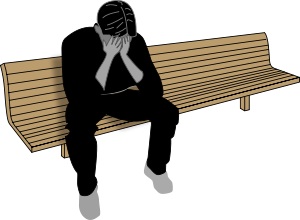Elkin et al (1989)
 One of the key questions in abnormal psychology is the effectiveness of different treatments. In the treatment of depression, some of the most common treatments are Cognitive-Behavioral Therapy (CBT), Interpersonal therapy (IPT) and drug therapy. Elkin et al (1989) wanted to see if there was any significant difference in the effectiveness of the three approaches to therapy.
One of the key questions in abnormal psychology is the effectiveness of different treatments. In the treatment of depression, some of the most common treatments are Cognitive-Behavioral Therapy (CBT), Interpersonal therapy (IPT) and drug therapy. Elkin et al (1989) wanted to see if there was any significant difference in the effectiveness of the three approaches to therapy.
The general approach in CBT for depression involves guiding clients through a number of structured learning experiences. Patients are taught to monitor and write down their negative thoughts to recognize the association between their thoughts, feelings, physiology and behavior. They learn to evaluate the validity of their thoughts and change dysfunctional thinking. The therapist also teaches adaptive coping skills such as breaking down large problems into smaller steps and decision-making by cost-benefit analysis.
The goal of IPT is to help the depressed client examine the ways in which his or her current interpersonal behavior might interfere with obtaining pleasure from relationships. For example, patients might be taught how to improve communication with others to have more satisfying social interactions and support. The focus is on developing effective social skills and the client’s current life situation. Techniques include discussion of interpersonal problems, exploration of and encouragement to express negative feelings, and the improvement of verbal and non-verbal communication.

Depressed clients were randomly assigned to one of four treatment conditions for four months: IPT, CBT, the drug imipramine or a placebo pill. The imipramine and placebo conditions were paired with clinical management in which minimal supportive therapy was provided because of the ethical need to provide some therapy for clients in those conditions.
A total of 250 patients were assigned to treatment. The sample came from three different treatment centers located in Pittsburg, Washington DC and Oklahoma City.
To be included in the study, patients had to meet the diagnosis of major depressive disorder with symptoms present at least in the two weeks previous to the study. Patients were excluded from the study if they had any other disorder in addition to MDD.
After obtaining informed consent, participants were randomly assigned to treatment conditions at each site. A total of 28 therapists took part in the study - 8 in CBT and 10 each in IPT and the drug treatment. All treatments lasted 16 weeks. CBT patients received 12 sessions during the first 8 weeks, followed by weekly sessions during the second half of the study.
Throughout the study, patients were carefully monitored. A large number of assessments were carried out before, during, and after the study. In general, three areas were assessed: symptoms, life functioning, and functioning related to particular treatment approaches - that is, in IPT were they actually developing better social skills? The assessments sought information from the client, therapist, an independent clinical evaluator blind to the treatment condition, as well as a significant other from the patient’s life, whenever that was possible.
The results of the study are rather complex. There was no significant differences in the reduction of depression or improvement of functioning between CT and IPT or between either of them and imipramine plus clinical management. In general, the three treatments achieved significant and equivalent degrees of success and were for the most part superior to the placebo group. The placebo-plus-clinical management group, however, did show significant improvement.
Imipramine was faster than the other treatments in reducing depressive symptoms during treatment. By the end of the 16 weeks of therapy, the two psychotherapies had caught up with the drug.
The outcome was influenced by the initial severity of the symptoms. Although less-severely-depressed placebo patients were doing as well as any of the treatment groups by the end of the session, the severely depressed patients in the placebo condition did not show much improvement. There was some evidence that IPT was more effective than CT with the more severely depressed patients.
At the 18-month follow-up, only 20 - 30 percent of the participants remained completely symptom-free of depression, regardless of the treatment that had been received. Patients in both IPT and CBT reported significantly greater effects of treatment on their capacity to establish and maintain interpersonal relationships and to recognize and understand sources of their depression.
The Elkin study is often seen as problematic for several reasons. Jacobson & Hollon (1996) point out that the results were not the same at all three sites. At one site CBT did as well with severely depressed patients as did imipramine, and at another site IPT did as well with these patients as did the drug. In addition, 33% of the imipramine patients dropped out before completing treatment. This high attrition rate was not seen in any of the other conditions.
In a recent study, Keller et al (2008) compared the effectiveness of drug treatment with CBT or a combination of both. With a sample of 681 participants with depression, all three groups showed significant improvement. Participants in the drug group improved more rapidly, but by the end of the 12 weeks, the therapy groups had caught up. The combination group showed the greatest change - an 85% improvement. This study may be seen as support for the original Elkin study.
Overall, however, studies of the effectiveness of treatment face several limitations. First, by excluding participants because of compounding factors like alcoholism, personality disorders, or suicidal tendencies, the sample becomes less representative of the general population of depressed patients. Therefore, the findings may not be as generalizable as we would wish.
In addition, there are several problems with comparing these different treatments. First, the goals of the treatments are different. The goal of treatment is often not just “to cure the patient.” Some treatments focus more on the process than the outcome. This means that as the patient is receiving therapy, although the techniques are the same, the way that the therapy is implemented is not. Each session the therapist determines which technique is most appropriate, based on the progress of the client. Thus, the treatments are not standardized - making it difficult to say that everyone in each condition received exactly the same treatment.
Depression, like several other disorders, also has a range of symptoms. Although the study by Elkin et al distinguished between severely depressed and less-severely depressed patients, it is difficult to compare treatments when the patients may have an array of symptoms and different reasons for the origin of their dysfunction.
The study monitored the effectiveness of the treatments by information from the patient, therapist and an objective observer. This use of data triangulation makes the study stronger. Simply getting data from the client could result in demand characteristics - or observer bias from the therapist.
The study also examined relapse rates. This is also problematic. How long should a treatment last? Most therapists feel that follow-up treatment may be necessary for many patients - depending on environmental triggers.
Finally, it is impossible to know if there was not a “third variable” which was responsible for the improvement. Eysenck argues that depression may “just goes away on its own” - a process known as spontaneous remission. Bennun & Schindler (1988) found that, in fact, regardless of the treatment, it was the client’s relationship with the therapist that was the most important factor in determining the success of a treatment.
Bennun I & L Schindler (1988). Therapist and patient factors in the behavioural treatment of phobic patients. Behavioral Journal of Clinical Psychology, 27, 145 - 151.
Elkin, I., Shea, M.T., Watkins, J.T., Imber, S.D., Sotsky, S.M., Collins, J.F., Glass, D.R., Pilkonis, P.A., Leber, W.R., Docherty, J.P., Fiester, S.J., & Parloff, M.B. (1989). National Institute of Mental Health Treatment of Depression Collaborative Research Program: General effectiveness of treatments. Archives of General Psychiatry, 46, 971-982.
Keller, M. B. et al (2008). A comparison of nefazodone, the cognitive behavioural-analysis system of psychotherapy, and their combination for the treatment of chronic depression. The New England Journal of Medicine, 342, 1462 - 1470.

 IB Docs (2) Team
IB Docs (2) Team
